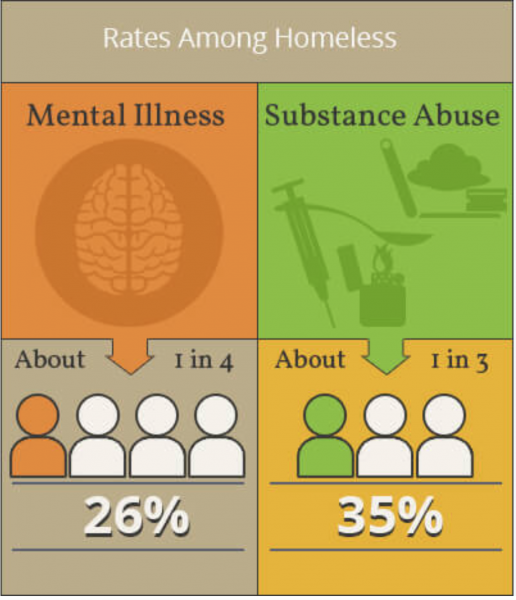Enlightenment Through Service
 Through my AmeriCorps National Health Corps-Florida position, I serve as the Health Educator at Sulzbacher Center - the largest homeless shelter in Northeast Florida. Coming into this position, I was most eager to begin training for the recovery class that I would be facilitating, in addition to implementing mental health relief classes for our clients. The one thing I learned about myself through college was that my passions rest within mental health and addiction, so I knew this was a great opportunity for me.
Through my AmeriCorps National Health Corps-Florida position, I serve as the Health Educator at Sulzbacher Center - the largest homeless shelter in Northeast Florida. Coming into this position, I was most eager to begin training for the recovery class that I would be facilitating, in addition to implementing mental health relief classes for our clients. The one thing I learned about myself through college was that my passions rest within mental health and addiction, so I knew this was a great opportunity for me.
At a homeless shelter, you will come across many individuals with mental health conditions; I am aware of that, and I have seen many different faces of mental health within my service term. However, it wasn’t until a certain conversation with a client that I realized how little I knew about mental health. The Jacksonville Speech & Hearing Center was coming to provide hearing screenings for our clients, and one particular client was eager, but apprehensive, to get one. After one of our health classes together, he came up to me and said, “Ms. Lisa, I want to have my hearing screening, but I need you there to make sure they don’t put wires or explosives in my head.” In the moment, I just smirked and blew it off, saying I’ll be there for his appointment. In complete honesty, I didn’t take it seriously because that’s the type of thing that I only pictured being said seriously in movies. No way my client believed that; it wasn’t real to me.
When I went home, I analyzed the situation over and over again in my head until I felt like a fraud. How can I say that I care about a cause when I don’t truly understand it in all of its forms? How can it not register to me that so many people suffer from worries like my client’s on a daily basis? This is reality for so many. Just because it isn’t my reality does not make these individuals’ worries any less real. I knew mental health played a role in what my client said, but I didn’t see how he could believe it. Despite all of the courses and trainings I have taken on mental illness, I still cannot comprehend it completely. It can be frustrating dealing with clients who have thoughts that you instantly consider irrational and unrealistic but that the client sees as completely legitimate. Learning about mental health/addiction and serving directly in the field, I realized, are two entirely different things.
 I scheduled a meeting with the CEO of Sulzbacher and explained how I felt that I no longer had any direction in life because the things I thought I cared about, I was clueless about. I described how I felt responsible for every client’s journey to living a full life despite their mental illnesses, meaning that I would carry the weight of any relapses, suicidal ideations, outbursts, and so forth, on my shoulders. I found myself avoiding my recovery class and any class dealing with mental health. I thought, if I can’t help the client on the social side, then I am a fraud. Expecting her disappointment, I was surprised when she just smiled and said “there is a difference between being overwhelmed and exhausted over work that is not for you versus work that is meant for you.” She continued, “Not everyone is meant to be on the front end providing services for clients. There has to be someone pulling the strings behind the scenes making the front end services available. You can be just as passionate behind the scenes as on the front end.”
I scheduled a meeting with the CEO of Sulzbacher and explained how I felt that I no longer had any direction in life because the things I thought I cared about, I was clueless about. I described how I felt responsible for every client’s journey to living a full life despite their mental illnesses, meaning that I would carry the weight of any relapses, suicidal ideations, outbursts, and so forth, on my shoulders. I found myself avoiding my recovery class and any class dealing with mental health. I thought, if I can’t help the client on the social side, then I am a fraud. Expecting her disappointment, I was surprised when she just smiled and said “there is a difference between being overwhelmed and exhausted over work that is not for you versus work that is meant for you.” She continued, “Not everyone is meant to be on the front end providing services for clients. There has to be someone pulling the strings behind the scenes making the front end services available. You can be just as passionate behind the scenes as on the front end.”
I never considered being the one behind the scenes, or even the fact that someone must have the role of designing and implementing programs for patients to receive the care that they need and deserve. It’s quite obvious to me now, but before, I never considered the process as a whole, including the work that goes into providing patients with access to care. There is an entire system of professionals behind those at the front end, and they are just as valuable to the patient.
Through my service term, I have learned a great deal about myself that contradicted what I originally believed. Counseling always drained me, but I felt like I had to do it in order to be an advocate for the issues I care about. People always say that it is okay to try something and for it not to turn out as expected. Situations like this may be disappointing, but they motivate you to work harder to discover what is meant for you. Through service, I learned that I should be okay with being uncomfortable in some situations, as long as I use them as an opportunity to reflect on the situation and myself rather than avoiding them. I cannot grow from being in a place of constant familiarly; there has to be some challenge or frustration to spark something within us to do better, or do different.
In the future, I may not be the one providing the direct care for these individuals, but I hope to be the one behind the scenes creating the opportunities for them to receive such care.
This blog post was written by NHC FL member, Lisa Drew.
Lisa serves at the I.M. Sulzbacher Center as a Health Educator.